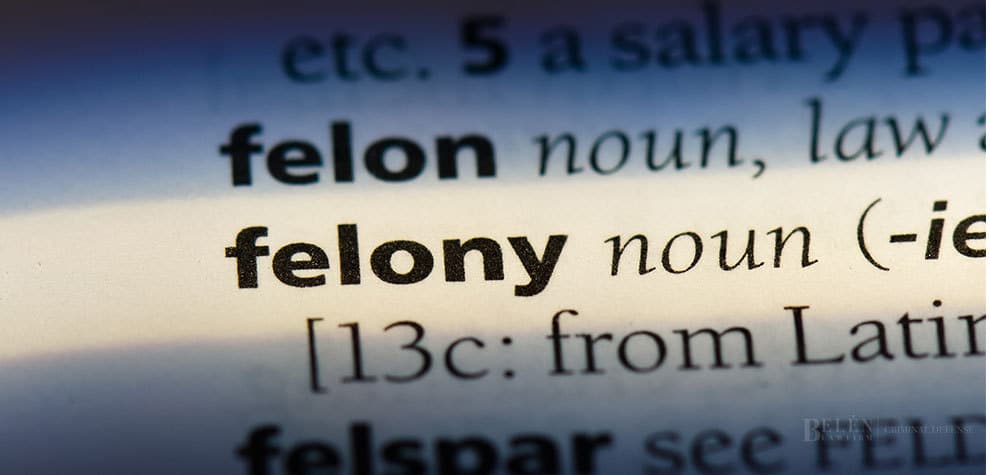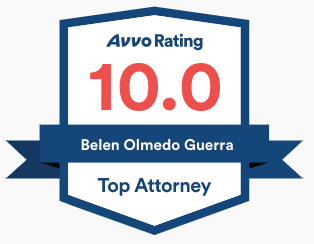An arrest on felony charges is a traumatizing experience, but it doesn’t have to be a life-changing one.
After the police arrest and charge you with a felony crime, every phase of the criminal trial process is important. Felonies in Arizona are no laughing matter. Prosecutors often push for the harshest penalties, and Arizona has some of the highest mandatory minimum sentences in the country. While the classifications listed may seem minor when compared to the result of the case, in reality, the classification of criminal charges can make the difference in what happens if you are convicted.
To avoid incurring a heavier sentence than you deserve, you need a qualified Arizona criminal defense attorney beside you every step of the way.
Belén Olmedo Guerra is a Phoenix criminal defense lawyer who has experience handling even the most severe felony offenses. In this post, Belén will give an overview of the Arizona felony classes and penalties. If you’ve been charged with a felony in Arizona, contact the Belén Law Firm to speak with an experienced Phoenix felony lawyer immediately. We offer payment plans and free consultations.
What is a Felony in Arizona?
A felony crime in Arizona is, by nature, far more serious and severe than a minor or misdemeanor conviction, which often involves possible jail time of less than a year. Meanwhile, a felony offense typically results in time in prison of a year or more. Felonies in Arizona include but are not limited to the following:
- Theft of property in Phoenix
- Violent crimes, including aggravated assault in Phoenix and homicide offenses
- Sex crimes in Phoenix
- Arizona drug charges
Arizona Felony Classes
Under Arizona Revised Statute 13-601, felonies fall into six classes: Class 1 felonies through Class 6 felonies. Class 1 felonies are the most serious and include things like homicide offenses in Arizona. Class 6 felonies, on the other hand, are the least serious. These offenses carry a maximum sentence of two years in prison. Under certain circumstances and with a good defense lawyer, the courts may even agree to charge a Class 6 felony as a misdemeanor.
Each type of felony charge is unique, depending on the facts of the case. Felonies in Arizona also have “enhancement categories” that increase the sentence. These categories include dangerous offenses, dangerous crimes against children, and repeat offenders. Some crimes, like possession of methamphetamine for sale, also have enhanced sentencing.
An attempted crime, wherein the defendant intended to complete the crime but was not able to for one reason or another, will reduce the class of felony by one classification. For instance, attempted murder would be a Class 2 felony rather than a Class 1 felony.
Arizona Felonies and Penalties
Felonies are crimes punishable by one year or more in state prison. Sentencing ranges depending on the class of the felony. Below are the classification of felonies in Arizona:
Class 1 Felonies in Arizona
This class of felony is the most serious. First and second-degree murder are the only Class 1 felonies in Arizona. First-degree murder is punishable by life in prison and even possibly the death penalty. Second-degree murder is punishable by a prison term of 16 years to life imprisonment.
Presumptive, Aggravated, and Mitigated Sentences
For crimes outside the Class 1 felony category, Arizona lawmakers set a presumptive sentence for each decreasing felony class. A presumptive term is a standard sentence, meaning the sentence the judge will give in most cases.
There are also mitigated and aggravated terms, according to Arizona Revised Statute 13-701. A judge may choose to apply the aggravated sentence, which is longer than the presumptive term. However, the prosecutor must first show aggravated circumstances. Examples of aggravated circumstances include:
- An accomplice was present
- A deadly weapon or dangerous instrument was involved
- The crime was especially cruel or heinous
- The victim was over the age of 65
A mitigated term is shorter than the presumptive sentence. A judge may choose a mitigated sentence if certain mitigating circumstances are present. Mitigating circumstances include:
- The defendant’s young age
- A minor role in the crime in question
Class 2 Felonies in Arizona
The presumptive term for a Class 2 felony is five years in prison, while the aggravated sentence is 12.5 years. Examples of Class 2 felonies include the production or creation of child pornography in Arizona and the crime of manslaughter in Arizona.
Class 3 Felonies in Arizona
The presumptive term for Class 3 felonies is three years and six months prison time. The aggravated term is eight years and nine months.
An example of a Class 3 felony is the cultivation of four or more pounds of marijuana.
Class 4 Felonies in Arizona
Class 4 felonies carry a presumptive term of two years and six months in prison. The aggravated term for a Class 4 felony is three years and nine months.
Theft of property between $3000 and $4000 is a Class 4 felony, as is negligent homicide in Phoenix.
Class 5 Felonies in Arizona
If lawmakers do not state a class for a felony, it is typically punishable as a Class 5 felony in Arizona. A Class 5 felony has a presumptive sentence of two years, and an aggravated term of two years and six months.
Pimping and pandering, which is profiting from or facilitating prostitution in Arizona, are both Class 5 felonies.
Class 6 Felonies in Arizona
These are the least serious felonies in Arizona. The presumptive term for a Class 6 felony is one year in prison. The aggravated term is two years in prison.
In some cases, A.R.S. 13-604 allows a judge to designate a Class 6 felony conviction as a Class 1 misdemeanor. This would mean a less serious sentence.
Fines for Felonies
Prison time is not the only punishment judges can give in Arizona. A judge can also impose fines of up to $150,000.
Arizona courts may impose additional fines against defendants convicted of drug crimes.
Prior Felony Convictions
Another circumstance that affects felony sentencing is a prior felony conviction. A person with two or more felony convictions or one prior conviction for a dangerous felony will receive a longer prison sentence than a first-time offender.
For example, if a court convicts someone of a Class 2 felony and that person has a prior dangerous felony conviction, the presumptive term doubles. Remember, the presumptive term for a Class 2 felony is five years. So, with a prior conviction, the presumptive term becomes aggravated and results in a sentence of ten years and six months.
What is the Statute of Limitations for Felonies in Arizona?
A statute of limitations is essentially a time limit for prosecuting a crime. This means the state must begin prosecuting a crime within the statute of limitations. The state has seven years to begin prosecuting for most felonies in Arizona. However, the most serious felonies, like murder, have no statute of limitations. This means the state can begin prosecution at any time, even many years later.
Why You Need An Attorney
There are a number of reasons why you need an experienced criminal defense attorney if you’ve been charged with a felony offense in Arizona. Here are a few of them:
- A felony conviction will become part of your permanent record, and in turn, part of your legal identity.
- Arizona does not allow records to be expunged or sealed.
- You can lose your right to vote and your right to own a firearm.
- Multiple felony convictions will result in very long prison sentences.
- You need an experienced trial attorney to guide you through the trial process.
- Attorneys have relationships with judges and prosecutors that they can leverage to get you a fair sentence.
- Attorneys can also mitigate your potential sentence as well as damage to your reputation.
Contact The Belén Law Firm Today!
Belén Olmedo Guerra is a thorough and highly experienced Phoenix criminal defense attorney. She’s one of the top felony defense lawyers in Phoenix and will handle your case with precision. To contact The Belén Law Firm, call 602-715-0908. You may also fill out a short form to schedule a free and confidential initial consultation.






















